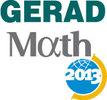HEC Montréal, Canada, 6 - 8 mai 2013
Journées de l'optimisation 2013
HEC Montréal, Canada, 6 — 8 mai 2013

TA11 Logistique / Logistics
7 mai 2013 10h30 – 12h10
Salle: Gérard Parizeau
Présidée par Suzanne Marcotte
4 présentations
-
 10h30 - 10h55
10h30 - 10h55Failure Modes and Effect Analysis for ITS Implementation in City Logistics
ITS is applied in improvement the efficiency of freight transportation in city logistics. There are Barriers to implement ITS successfully. The Failure mode and effect analysis is preventive technique to decrease failure rates, identifies the causes and potential defects. The risks are specified based on severity, occurrence and detection values.
-
 10h55 - 11h20
10h55 - 11h20A New Model for a Fair Relief Distribution Network
The emergency logistics field is a new and particular challenge for logistics’ managers. In these networks, the satisfaction of the affected people’s demand is much more important than the cost minimization. And more than that, emergency logistics’ managers are looking for a network that ensures an equitable distribution of resources over affected people. We propose a new mathematical formulation that reflects this interest, and its effectiveness is supported by some preliminary numerical results.
-
 11h20 - 11h45
11h20 - 11h45Location Problems in Humanitarian Logistics
In this talk, we present the fundamental differences between location problems in commercial and the broad field of humanitarian logistics. We also focus on areas in which additional research is required to ensure that analytical formulations provide a realistic depiction of the system being modeled. This talk is concluded by presenting key findings and an outline of future research directions.
-
 11h45 - 12h10
11h45 - 12h10Integrating Shared Storage Space Deployment in the Holographic Design of Refurbishing and Recycling Facilities
Our research aims to develop a refurbishing and recycling facilities design methodology integrating buffer storage grouping and location decisions. It also investigates the space and flow efficiency issues at stakes. We adapt and extend the HoloDesign methodology for such purposes. We then provide preliminary empirical results and insights.

